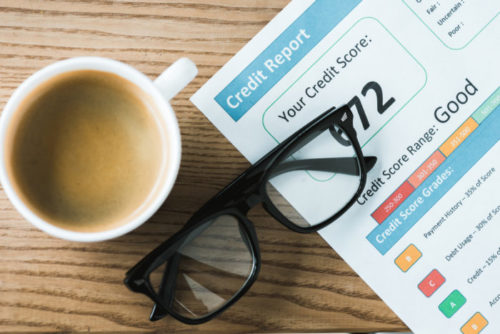Good credit — along with a good credit score to prove it — is a foundational part of a modern financial strategy. It can be a deciding factor when you apply for a mortgage, credit card, or auto loan. It can also help you qualify for lower interest rates and refinancing. A quality credit score can even be the deciding factor in whether you qualify for a job.
If you want to cultivate and maintain a healthy credit score, it’s important that you adopt the right financial habits. Here are several of the wisest ways to use your credit in order to maintain a good credit score.
Table of Contents
Tips for Maintaining Good Credit
Your credit score is influenced by a variety of different financial behaviors, such as how you make payments, manage your debt, or make credit inquiries. These factors are aggregated into a numerical approximation of your trustworthiness (i.e. your credit score) — especially when it comes to borrowing money.
With that said, here are seven specific financial best practices that can help you develop and then maintain a good credit score.
Understanding and Tracking Your Credit Score and Report
It’s difficult to maintain something that you don’t understand. That’s why it’s worth beginning with an analysis of which factors go into calculating your credit score in the first place.
If you’re starting from scratch (i.e. you don’t have a credit score yet), the first thing you need to do is open a lending account. You may need a cosigner to do so, since you don’t have a credit history yet. Once this is done, begin making payments. Usually, your score will appear within the next three to six months.
Once you have your score, the three major credit bureaus will begin tracking things like your payment history, the age of your credit, and your credit utilization ratio. The state of these will be reflected in both your credit score and your credit report, which lenders will want to review before they let you borrow money.
The importance of your credit score and credit report cannot be overstated. Therefore, it’s wise to get into the habit of reviewing both on a regular basis. This will help you catch any negative trends in your financial behavior and spot and dispute any errors with the credit bureaus.
Making Payments On Time
One of the simplest ways to maintain a healthy credit score is by making all of your payments on time. Even if a missed payment doesn’t incur a late fee, if left unresolved for too long, it can still lower your score and can hang around on your credit report for upwards of a decade.
Set up payment schedules, turn on automatic reminders, and do everything you can to make payments on time.
Managing Credit Balances
One of the worst ways to drag down a good credit score is by using too much of your available credit. In fact, your credit utilization ratio accounts for 30% of your entire credit score.
There’s no hard and fast rule for what constitutes a healthy credit balance. However, typically you want to keep your credit utilization at or below 30%. If you find you need more than that for your revolving credit each month, consider applying for a new card to increase your overall credit available. Just keep in mind that this will decrease the average age of your credit and may lead to a slight drop in your score in the short-term.
Keep Old Credit Cards Open
At times it makes sense to cancel an old credit card. For instance, if you know you’re going to want to use it, it may be best to simply get rid of it. However, if you don’t mind leaving your old credit accounts open, it’s wise to do so — at least as far as your credit score is concerned.
If you close an old credit card account, you simultaneously raise your credit utilization ratio and lower your average credit age, both of which are key factors for a good credit score.
Consolidate Credit Cards
If you have debt spread across several different credit cards, one of the ways that you can manage it and raise your credit score at the same time is by consolidating your debt into a single account.
This process will typically give you better terms, a lower payment, and improved credit as you continue to pay your bills over time.
However, once again, consolidation can also have the effect of lowering your score in the short term. This is partially due to the act of opening up a new line of credit, which can lower your score at any time. In addition, if you consolidate debt, it’s seen as a negative action by the credit bureaus, who may temporarily lower your score after the change is made.
If you’re okay with a brief drop in your score and are committed to a long-term credit-building strategy, though, consolidating your credit can be highly effective over time. If you find that the short-term credit score decrease isn’t a good option, you can opt, instead, to focus on paying off your credit cards with the snowball method. When you follow this strategy, you focus on the smallest debt first and work up to the largest, thus providing a similar effect to consolidating your debt.
Managing All of Your Debt
Along with making payments and consolidating debt, it’s wise to adopt holistic financial management habits. Debt management includes activities such as:
- Only taking out a loan when you need to.
- Creating a budget and updating it regularly.
- Monitoring your credit score and report.
- Taking care of your health.
- Creating both short- and long-term financial plans.
Properly managing your debt through healthy habits is an excellent way to naturally maintain a good credit score.
Limit Credit Inquiries
Credit checks occur in a variety of different scenarios. For instance, if you personally check your credit it will likely only count as a soft credit check and it shouldn’t affect your credit score.
However, if you apply for a loan or a credit card, you’ll be subjected to a hard credit check. This will lower your credit score and can remain on your credit report for a couple of years.
While necessary at times, you should avoid superfluous hard credit inquiries. If several must be made in a short period because you need an influx of cash, try to conduct them all within 45 days, as they will then only count as a single credit check.
Image Source: https://depositphotos.com/





